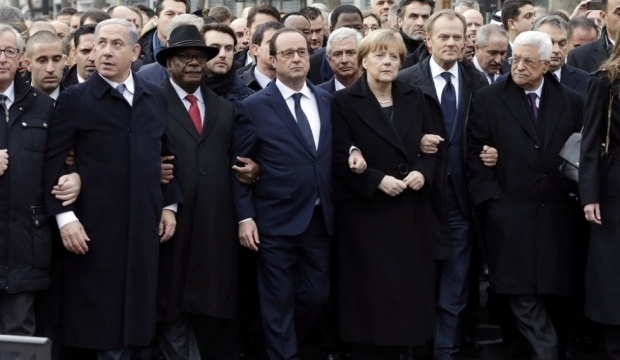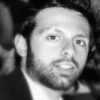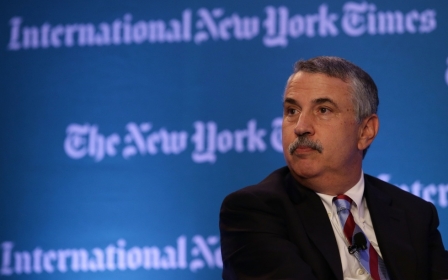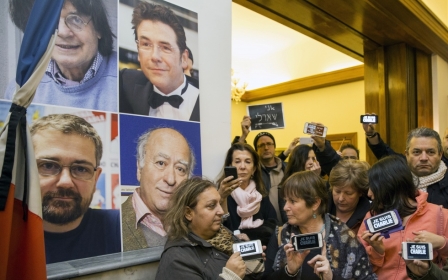Hypocrisies of states exposed in Paris march

Over a million people marched in Paris. Those people remained numbers, as their faces and physical presence were shielded with the faces of dozens of world leaders that led the march. The way in which France mobilised to mourn the victims and denounce extremism is admirable and worthy of praise. While terrorism is clearly a source of fear to millions, world leaders saw in the occasion a chance to polish their image on one hand and advance their political agendas on the other.
Yet the intervention of politicians, taking the side of the victims and the journalists, led the public to swallow a hard and inconvenient truth: only states are allowed to get away with terrorism. The whole political fiasco seems to have backfired, as the public spared no medium to expose the hypocrisies of the politicians that led the people’s march.
Naming and shaming leaders
London-based student Daniel Wickham’s Twitter feed went viral as he exposed the hypocrisies of the front-row leaders one by one. The most blatant, of course, is Israeli Prime Minister Benjamin Netanyahu. Regarding journalists, Israel under the leadership of Netanyahu has killed more journalists than any other country in the world – apart from Syria. In its latest war on Gaza, Israel killed 17 journalists.
As for Egypt, represented by Foreign Minister Sameh Shoukry in the Paris march, Al Jazeera photojournalist Mahmoud Abou Zeid, known as Shawkan, has been detained for over 500 days, along with tens of thousands of activists and anti-coup detainees.
King Abdullah of Jordan sentenced a Palestinian journalist to 15 years in prison with hard labour. Algeria, represented in the march by its Foreign Minister Ramtane Lamamra, has detained journalist Abdessami Abdelhai for 15 months without charge. Tunisia, represented in Paris by its Prime Minister Mehdi Jomaa, has recently detained blogger Yassine Ayan for three years under the accusation of “defaming the military”.
On top of its breaches to human rights in dealing with activists, Bahrain is the second biggest jailer of journalists per capita in the world. Yet it was unashamedly represented in the march by its foreign minister. Bahrain’s atrocities are only surpassed by Saudi Arabia, who recently flogged blogger Raif Badawi in public for “insulting Islam”.
On the European side of the front-row, Secretary General of NATO, Anders Fogh Rasmussen, is yet to be held accountable for deliberately bombing and killing 16 Serbian journalists in 1999. Polish Prime Minister Ewa Kopacz marched with pride despite her government raiding a magazine to seize recordings embarrassing for the ruling party.
As for UK Prime Minister David Cameron, the Guardian newspaper was threatened with prosecution and had its documents destroyed. Ireland still considers "blasphemy" a criminal offence yet their Prime Minister Enda Kenny marched to protect freedom of speech. On his side, Russian Foreign Minister Sergei Lavrov represented a country with one of the highest rates of censorship where dozens of journalists have been killed because of their work in recent years. Lavrov might have gained some confidence seeing Turkish Prime Minister Ahmet Davutoglu march confidently despite representing a country that imprisons more journalists than any other country in the world.
The inevitable contradictions of power politics
While acknowledging the hypocrisies of the moment, one must not fall for the vicious circles of moral arguments and idealism in politics. Power politics, since the beginning of mankind, is by nature manipulative and pragmatic. With such tactics, contradictory stances are inevitable. Having said that, it is important to expose contradictions and understand them as they are. Not that we have any other way to manage and rule societies, but seeking accountability for damage done by power politics is key to minimise the losses and force leaders to be less hypocritical, if that’s plausible.
Equally important is a political truth that is perpetually overshadowed by the discourse of power and the front-row in the Paris march. The truth is that terrorism is in essence state-sponsored. Back to the origins of it all, there is a huge arms industry that seeks to expand its market without any obstacles, principles or laws. The thousands of bullets shot in Syria, Nigeria, Pakistan and Iraq every day are not produced in Beirut. They are largely produced in the countries of the leaders that led the march in Paris against terrorism.
Power and its abstract enemy
As much as it is admirable to see millions marching to protect enlightened values, it is equally frustrating to see millions concerned with such an abstract enemy: Islamic extremism. Such abstraction allows the power-obsessed media to innovate in describing how and where the enemy materialises: Birmingham according to Fox News, bearded men according to a woman on the radio, the burka according to the French right-wing, or simply Muslims according to Islamophobes.
For power politics, it is always favourable to have a certain degree of abstraction in the image of the enemy, as it helps to overshadow the contradictions of realpolitik. But for the people, it is never in their favour. There is no plausible way to overcome terrorism before being able to hold states and leaders accountable for their own breaches of the peoples’ rights and atrocities against journalists and free speech. Until then, we are marching in millions for righteous causes and hypocrites are leading the march.
- Ibrahim Halawi is a London-based researcher and a PhD candidate in Politics at Royal Holloway University of London. His research focuses on power dynamics and counter-revolution in the Arab World. He has published contributions on Political Islam in the context of the Arab Spring and the geopolitical challenges to secularisation in the Arab World. Also, he founded a secular student-run newspaper in Lebanon.
The views expressed in this article belong to the author and do not necessarily reflect the editorial policy of Middle East Eye.
Photo: Netanyahu (L) Hollande (C) and Abbas (R) all attend Sunday's march (AFP)
New MEE newsletter: Jerusalem Dispatch
Sign up to get the latest insights and analysis on Israel-Palestine, alongside Turkey Unpacked and other MEE newsletters
Middle East Eye delivers independent and unrivalled coverage and analysis of the Middle East, North Africa and beyond. To learn more about republishing this content and the associated fees, please fill out this form. More about MEE can be found here.





